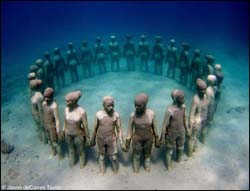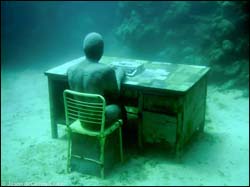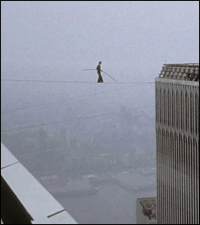january  2011
2011
 So I dyed my hair pink last weekend — I guess you could say for the New Year. Now anyone reading this who doesn't actually know me may be thinking, "wait, your hair hasn't always been pink?" No, only in spirit. Although the friend who helped me do it says it seems like it's always been this color, or should have been anyway. Another simply said, "it's very you."
So I dyed my hair pink last weekend — I guess you could say for the New Year. Now anyone reading this who doesn't actually know me may be thinking, "wait, your hair hasn't always been pink?" No, only in spirit. Although the friend who helped me do it says it seems like it's always been this color, or should have been anyway. Another simply said, "it's very you."
Which is why I find it so strange when other people ask me why. "Why?" It seems like such a bizarre, nonsensical question, like some special dialect of small talk I haven't studied enough to engage in fluently. I'm pretty sure it's never occurred to me to ask someone why they decided to do something different with their hair, or get a tattoo or buy a car or have a baby (okay, that last one I've wanted to ask, but unfortunately it's the only one you can't). Honestly, how weird would this sound:
Someone: I just bought a new car!
Me: Wow, really — why?
What makes it even weirder to me, not to overthink this thing too much, is that these people can't possibly be expecting the kind of response that would actually justify an honest "why," something profound, philosophical and insightful, the end result of a lengthy, honest and unselfconscious period of introspection. If we ever engage in such things, we are still unlikely to have them rehearsed and at the ready, elevator pitch-style, to toss out when anyone expresses an interest.
We may wonder about our coworker who, after wearing the same shoulder-length shag and highlights since the Clinton administration, suddenly goes short and sporty over the weekend. Invariably she will say "it was time for a change," which seems to satisfy everyone, but who can say if she even knows herself? Maybe since the birth of her first child, it's been all she can do to drag herself out of bed and into the office on time, let alone indulge in the old morning ritual with a round brush and blow dryer. And maybe those days are beginning to feel like a distant dream of a leisurely existence that bears no resemblance at all to the life she has now.
Or maybe it was her last visit to the stylist, the one she's been seeing for years, when she suddenly found herself watching the women around her instead of reading her magazine, and thinking that their short, sporty hairstyles looked carefree and hip while she just looked tired and outdated. Or maybe she caught her husband looking at another woman. Or she saw something on television that implanted a subliminal suggestion. Or she's been thinking of leaving her husband and shedding her long hair is just a hackneyed metaphor, a stand-in for her not yet realized but slowly materializing dream of freedom. Any of those would make perfect sense, but no one expects to hear them in response to a casual, "so why'd you cut your hair?"
 There's this artist named Jason de Caires Taylor who just finished sinking 400 life-size stone statues off the coast of Cancun, Mexico. My friend discovered him and sent me a link to a web site with dozens of pictures and videos of all his installations. They're like nothing I've ever seen before — unearthly and eerie, these submerged congregations waiting just beneath the surface for something — I watched every video on the site, sitting for an hour in rapt fascination. His creations have a speechless, spiritual quality, like a sentimental moment in an apocalyptic story — the boy robot sleeping for eternity beneath the frozen towers of a drowned Manhattan — or an ancestral dream from our collective unconscious.
There's this artist named Jason de Caires Taylor who just finished sinking 400 life-size stone statues off the coast of Cancun, Mexico. My friend discovered him and sent me a link to a web site with dozens of pictures and videos of all his installations. They're like nothing I've ever seen before — unearthly and eerie, these submerged congregations waiting just beneath the surface for something — I watched every video on the site, sitting for an hour in rapt fascination. His creations have a speechless, spiritual quality, like a sentimental moment in an apocalyptic story — the boy robot sleeping for eternity beneath the frozen towers of a drowned Manhattan — or an ancestral dream from our collective unconscious.
 Watching a video about "Vicissitudes," the circle of submerged children facing outwards, their hands clasped in silent solidarity, sent me on a weird and not entirely pleasant trip in which I envisioned future archaeologists one day stumbling across Taylor's installation and getting the scare of their lives. I speculated about this with Mr. Pink and he countered that they couldn't very well "stumble across" them if they've all been this well documented.
Watching a video about "Vicissitudes," the circle of submerged children facing outwards, their hands clasped in silent solidarity, sent me on a weird and not entirely pleasant trip in which I envisioned future archaeologists one day stumbling across Taylor's installation and getting the scare of their lives. I speculated about this with Mr. Pink and he countered that they couldn't very well "stumble across" them if they've all been this well documented.
Yeah, but documented on what, I asked, Youtube? Double-layer DVDs? The cloud..? I thought about all the books and videos, paintings, articles, photographs and everything else that I and everyone I know, has ever written, recorded or drawn...
For all we know, the ancient inhabitants of Atlantis were fanatical about data storage, wisely upgrading from magnetic tape to digital media, backing up all their vital records on microfiche, scanning the contents of their libraries into massive server banks. (And so it goes.)
 In every interview on Taylor's web site, that one question invariably arises: "Why do you do this?" He talks about the widespread die-offs of the coral reefs, of the degradation of coastal habitats, the effects of climate change, chemical runoff and plastic pollution on the world's oceans. All of which make a kind of sense but none of which even comes close to answering the question because there is no answer, really.
In every interview on Taylor's web site, that one question invariably arises: "Why do you do this?" He talks about the widespread die-offs of the coral reefs, of the degradation of coastal habitats, the effects of climate change, chemical runoff and plastic pollution on the world's oceans. All of which make a kind of sense but none of which even comes close to answering the question because there is no answer, really.
Why do this? Why do anything?
Throughout human history, one of the common themes that seems to cross all cultural and temporal divides is the unifying drive to make our mark on the world. We painted cave walls and carved cities out of stone, we erected monuments and memorials, stone by stone — armies of ants with godlike aspirations. Digging, sifting, scratching, burning and boiling raw materials out of the earth and forging them into harder, shinier, sharper things with which to further reconfigure our reality. When we weren't marking our surroundings, we were marking ourselves. The oldest human remains we've found bear the distinctive marks of self-modification; pierced and tattooed, miraculously preserved by ice or arid climate, this flesh speaks to us from across the divide: "I was here."
About ten years ago, Mr. Pink and I decided to get tattoos — to avoid building faux suspense, I'll say outright that it didn't happen. We never decided not to. We just never did it. But in the lead up to the act, I went through a very-Virgo process of weighing the pros and cons, as anyone should do when considering a permanent and life-changing decision. In the midst of this, I wrote out a lengthy exposition of my "reasoning" in response to someone who asked me why.
A while back, we got some fake tattoos and wore them all weekend. Walking to the store I kept catching my reflection in mirrors and store windows, and seeing the fake tattoo around my arm would make me smile and laugh giddily. All weekend, I debated the cons — What if I hate it when I'm 40..? What if I'm invited to the Oscars and have to wear a sleeveless dress..? Whatifwhatifwhatif? — meanwhile, every time I spotted my tattooed reflection in a car window, I found myself grinning uncontrollably.
Then it hit me — the giddiness was almost an answer in itself — I never wanted to become the kind of person at 40 who couldn't relate to her 27-year old self. I didn't want to become a person who would regret such a decision, and the permanence of that decision would act as a reminder to remain true to the things that make me who I am.
Also, there's this thing about how we're "spiritual beings having a human experience, not human beings having a spiritual experience," that we're souls living in bodies in order to learn, to grow and feel all the things that set being alive and human apart from that other state innate to spiritual beings.
Instead of asking why I wanted to mark my body forever, I suddenly realized the better question was, why wouldn't I? It's mine, after all, and a tattoo is a way of making a statement — not the world, but to myself — about my soul's intentions, of imprinting this body with its immortal identity. We tend to be afraid of our bodies, their vulnerability to disease and injury, of aging and experience, of their beauty and their ugliness. We tend to treat our bodies as if they were on loan to us, like we'll have to explain and pay a fine for any damages we've sustained upon returning them. Not being afraid to leave a mark on our bodies is a way of refusing to view them as fragile, temporary, borrowed. Isn't that the point of incarnation?"
 Philippe Petit, the high-wire performer who strung a wire between the twin towers and danced for an hour in that magical space — a space so perfectly preserved in our minds, it will always be there — says he doesn't understand the question people have been asking him ever since. Isn't creating something beautiful, like creating life, its own reason? In the giddy aftermath of that eternal moment, as he was led away from the building in handcuffs by the bemused police officers who'd waited helplessly at the edge of the roof for him to finish so they could take him into custody, someone asked him for the first of countless times, "why did you do it?" His face flushed with exhilaration, his expression beatific, he gave the best and only answer he could:
Philippe Petit, the high-wire performer who strung a wire between the twin towers and danced for an hour in that magical space — a space so perfectly preserved in our minds, it will always be there — says he doesn't understand the question people have been asking him ever since. Isn't creating something beautiful, like creating life, its own reason? In the giddy aftermath of that eternal moment, as he was led away from the building in handcuffs by the bemused police officers who'd waited helplessly at the edge of the roof for him to finish so they could take him into custody, someone asked him for the first of countless times, "why did you do it?" His face flushed with exhilaration, his expression beatific, he gave the best and only answer he could:
"There is no why."